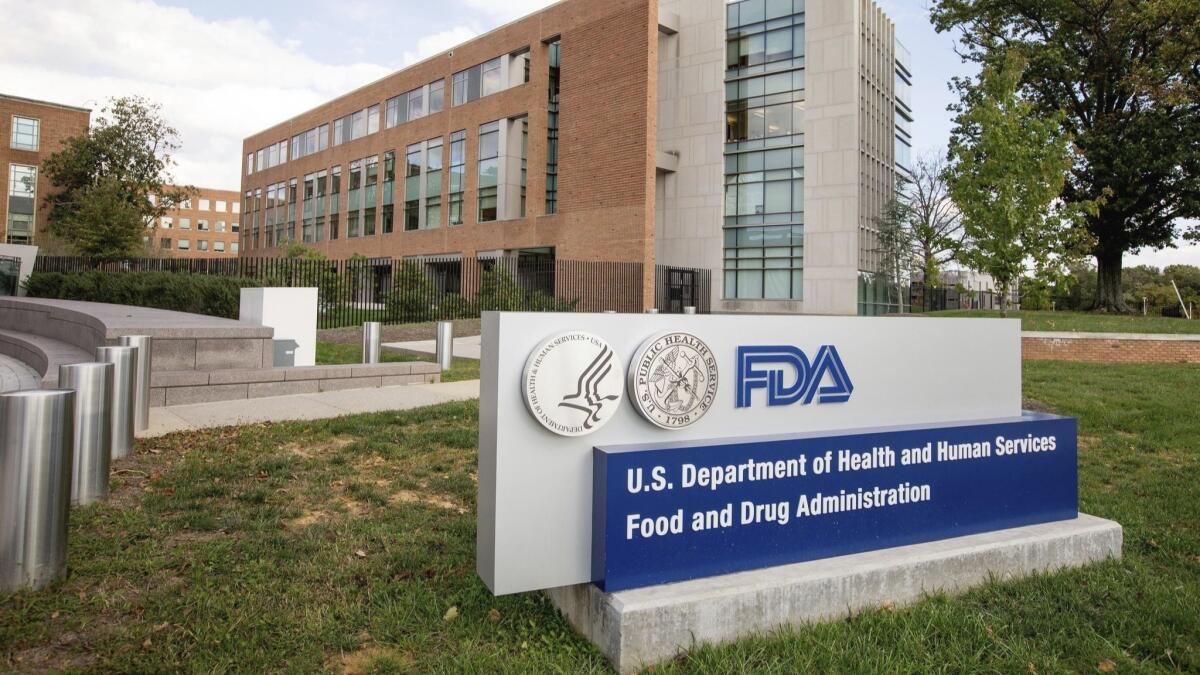For persistent depression, FDA approves a novel treatment based on ketamine

- Share via
Reporting from Washington — The Food and Drug Administration approved a novel antidepressant — the first in decades to work in a completely new way in the brain — for people with depression that does not respond to other treatments.
The drug, a nasal spray called esketamine, has been eagerly anticipated by psychiatrists and patient groups as a powerful new tool to fight intractable depression. The spray acts within hours, rather than weeks or months as is typical for current antidepressants, and could offer a lifeline to about 5 million people in the United States with major depressive disorder who haven’t been helped by current treatments, which accounts for about one in three people with depression.
“This is undeniably a major advance,” said Jeffrey Lieberman, a Columbia University psychiatrist. But he cautioned there is still much that isn’t known about the drug, particularly regarding its long-term use. “Doctors will have to be very judicious and feel their way along,” he said.
The medicine has a complex legacy because it is a component of ketamine, which was approved years ago as an anesthetic and was once popular as a party drug called Special K. Esketamine must be administered under medical supervision and can only be used in a certified doctor’s office or clinic, according to the conditions of the FDA approval. It is to be taken along with an oral antidepressant.
For some patients who have searched for a depression treatment for years, the results of ketamine treatment have been profound.
Dennis Charney, dean of the Icahn School of Medicine at Mount Sinai Health System in New York, did extensive early work to show ketamine was an effective treatment for depression. In 2000, he and other researchers published the first study showing that intravenous ketamine rapidly relieved depression.
After giving IV ketamine to seven patients, “to our surprise, they started saying within a few hours that they felt better,” Charney said. “It was a wonderful shock.”
That was the experience of Michael Wurst of Secaucus, New Jersey. Wurst, 37, has suffered from depression as far back as he can remember, but only began to seek therapy and medication in college. He had a negative experience with an oral antidepressant and stopped treatment. Later, when he decided to get therapy again, he was reluctant to try medication but eventually spent a decade cycling through various drugs and combinations, none of which helped.
Then, two years ago, he began receiving ketamine as part of a clinical trial. The first three treatments had no effect, but the fourth “was like a goddamn miracle, like someone just turned the light switch on,” Wurst said. “It was like the weight in my head, the cloud that was there for decades, just disappeared. It changed the entire course of my life.”
Wurst said he feels like he’s been given back his future. He and his wife just bought a house and he’s no longer afraid to think about having children.
“This offers hope, in capital letters,” said Charney, who is a co-inventor on a patent on the use of ketamine as a depression treatment that has been licensed by Johnson & Johnson. Esketamine, the drug Johnson & Johnson received approval to sell, will appear under the brand name Spravato.
The company opted for a nasal spray after concluding that IV administration was impractical and a pill wouldn’t get enough of the drug to the brain, according to David Hough, the esketamine team leader at Janssen Research & Development, which is part of Johnson & Johnson.
Lee Hoffer, a medical anthropologist at Case Western Reserve University who studies addiction and the use of illicit drugs, was a member of the FDA advisory committee that recommended last month that the drug be approved. He said that ketamine was a club drug used mainly in the 1990s and 2000s, and can have powerful effects, including hallucinations, tunnel vision and dissociative effects that make people feel untethered from their surroundings.
The FDA advisory committee voted 14-2 in February to recommend approval of the drug. That’s despite the fact that the evidence was more mixed than for other approved antidepressants, according to a report by agency staff. A memo said that typical antidepressants are approved on the basis of two positive short-term trials, but there was only one such trial for esketamine. The second trial considered in support of the drug was a withdrawal study, and FDA said its division of psychiatry products had not previously considered such a study as one of the primary pieces of evidence for an approval, but added “it is not unreasonable to do so” in its report. Adverse events included sedation, disassociation and an increase in blood pressure.
Despite the fact that ketamine can have euphoric effects, Hoffer said he is not very concerned about abuse of the new drug because of safety measures that will be put in place. Unlike a prescription that can be taken home and might be diverted into recreational use, esketamine will be administered under supervision in a health center. He also noted that although ketamine has been available for decades and has been used off-label to treat depression, he hasn’t encountered people who currently use the drug recreationally in his research and interviews with illicit drug users.
“There are risks associated with the drug, but I think the benefits here probably outweigh those,” Hoffer said.
Hough said patients would receive the treatment two times a week for a month, then every week and then every other week, along with an oral antidepressant. Whether a patient stays on the drug for more than six months or a year will be up to the patient and his or her doctor, he said.
Older antidepressants target the neurotransmitters serotonin, norepinephrine or dopamine. Esketamine affects the receptor for a different brain chemical called glutamate.
Gerard Sanacora, a professor of psychiatry at Yale University School of Medicine, who has led studies sponsored by Janssen and accepted consulting payments from the company, said that he believes the esketamine results have already begun to invigorate the broader field of developing psychiatric drugs. A decade ago, he noted, companies began to abandon the effort.
“Everything that was coming out was another me-too antidepressant, and anything that was truly novel wasn’t able to show clinical benefit,” Sanacora said. “It’s really opened a whole new vista of opportunities and has changed the way we think about the pathophysiology of depression in some ways . . . It has infused energy into the field, that we can do better.”
Johnson and McGinley write for the Washington Post.






